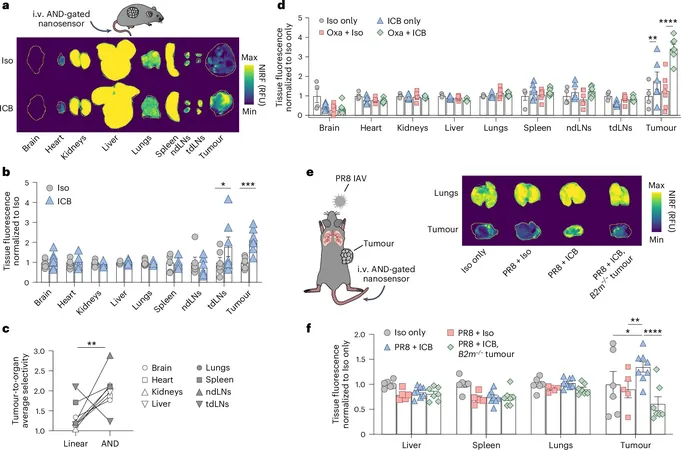
Revolutionary Cell-Free Biosensors: The Future of Cancer Detection Awaits!
2025-01-13
Author: Sarah
Groundbreaking Innovation in Cancer Detection
Groundbreaking research from Georgia Tech is changing the landscape of cancer detection and monitoring with innovative cell-free biosensors that promise not only accuracy but also simplicity. Imagine tiny detectives that can detect critical biological markers in your body with the precision typically associated with advanced computer logic.
These state-of-the-art biosensors leverage a unique "AND" function—akin to the way you log in with both a username and a password. Unlike conventional biosensors that rely on genetic materials like cells or DNA, these novel sensors are constructed from engineered molecules. This shift not only enhances precision but also streamlines the manufacturing process, helping to significantly reduce false positives—making them far more practical for real-world clinical applications. Moreover, being cell-free minimizes the risk of immunogenic side effects that could complicate patient treatment.
Gabe Kwong, an associate professor and the Robert A. Milton Endowed Chair at Georgia Tech's Wallace H. Coulter Department of Biomedical Engineering, spearheads this transformative study, published in Nature Nanotechnology. Kwong believes these biosensors could lead to "accessible, personalized, and effective treatments that ultimately save lives."
Breaking Through Traditional Barriers
Kwong's team sought to overcome the limitations posed by existing biosensors, particularly those employed in CAR-T cell therapies which often recognize tumor cells using complex genetic engineering. This conventional method tends to be labor-intensive, time-consuming, and costly. By developing biosensors that incorporate iron oxide nanoparticles combined with cyclic peptides, the researchers have significantly simplified the biosensor production process, which could pave the way for economical, large-scale manufacturing of these highly precise diagnostic tools.
Unlocking High-Security Detection
What sets these biosensors apart is their proficiency in detecting cancer signals and monitoring treatment responses through a high-level Boolean AND-gate logic. The cyclic peptides are engineered to respond only when they interact with two specific proteases—granzyme B from the immune system and matrix metalloproteinase from cancer cells. Just like a high-security lock that opens only with two unique keys, these biosensors signal the presence of cancer only when both proteases are active.
"This specificity allows us to hone in on cancer activity accurately," explains Anirudh Sivakumar, the lead author and postdoctoral researcher in Kwong's lab. "It’s crucial for understanding precisely when immune cells are targeting and eliminating tumor cells."
Game-Changing Specificity
Animal studies have showcased the biosensors' success in differentiating between tumors responsive to immune checkpoint blockade therapy (ICBT)—a groundbreaking cancer treatment that boosts the immune response—versus those that build resistance. Notably, the sensors demonstrated their adeptness at avoiding false signals from other health issues, such as flu infections, highlighting their exceptional specificity.
"This level of pinpoint accuracy can be revolutionary," Kwong noted. "Imagine the potential of identifying which patients are benefiting from therapy early in their treatment journey."
The collaborative journey for these biosensors began five years ago, involving partnerships not only within Georgia Tech but also with researchers from the University of California-Riverside. This multidisciplinary effort has transformed an ambitious vision into a viable tool that is poised to significantly impact health care outcomes.
As cancer treatment advances, the introduction of these cell-free biosensors may not just be a trend but could represent a fundamental shift in how we approach diagnosis and treatment monitoring, making the dream of personalized medicine a much closer reality.
Conclusion
Stay tuned: The future of cancer detection is on the horizon, and it’s brighter than ever!



 Brasil (PT)
Brasil (PT)
 Canada (EN)
Canada (EN)
 Chile (ES)
Chile (ES)
 Česko (CS)
Česko (CS)
 대한민국 (KO)
대한민국 (KO)
 España (ES)
España (ES)
 France (FR)
France (FR)
 Hong Kong (EN)
Hong Kong (EN)
 Italia (IT)
Italia (IT)
 日本 (JA)
日本 (JA)
 Magyarország (HU)
Magyarország (HU)
 Norge (NO)
Norge (NO)
 Polska (PL)
Polska (PL)
 Schweiz (DE)
Schweiz (DE)
 Singapore (EN)
Singapore (EN)
 Sverige (SV)
Sverige (SV)
 Suomi (FI)
Suomi (FI)
 Türkiye (TR)
Türkiye (TR)
 الإمارات العربية المتحدة (AR)
الإمارات العربية المتحدة (AR)